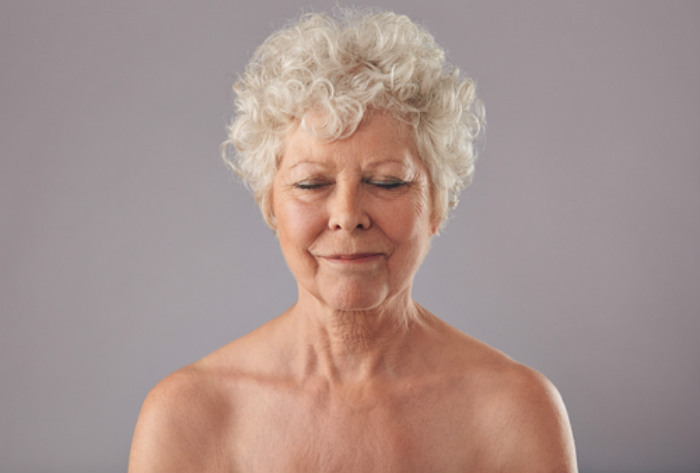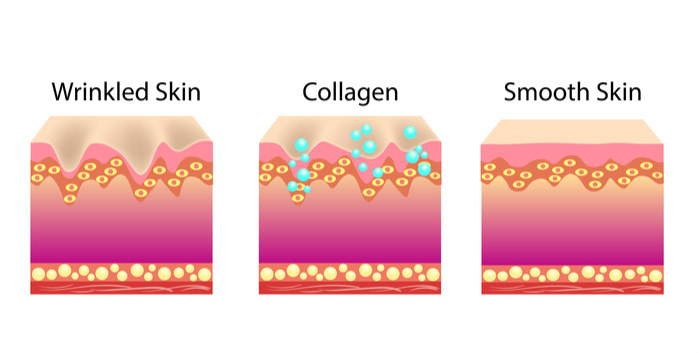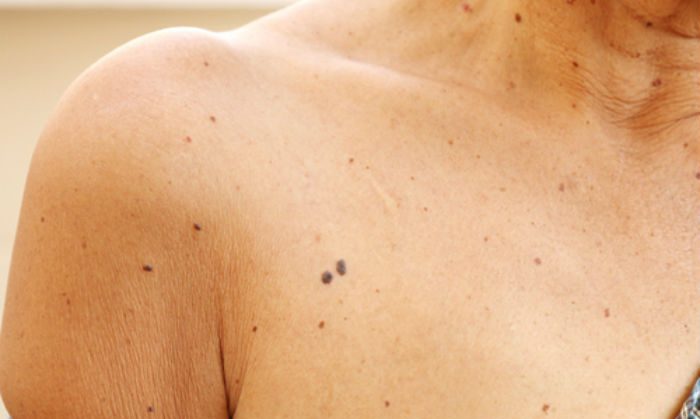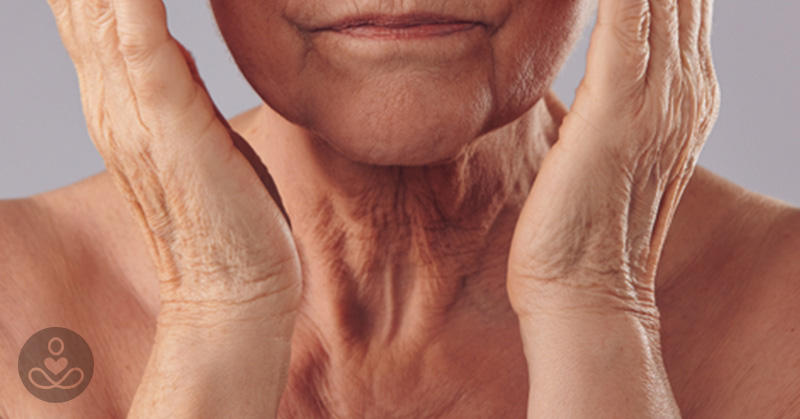Age is just a number – while this has certainly proven to be true, feeling young and looking the part are two different things, and the fine lines, wrinkles, gray hair, and sagging skin can have a real impact on how we perceive ourselves as we get older.
Many of us try countless creams and procedures and spend hundreds or even thousands of dollars on anti-aging products that never seem to work. Thankfully, as we begin to understand aging better and what causes the changes in our appearance, there are preventative measures, lifestyle changes, and natural treatments coming out that do help.
What Causes Wrinkles?
Before you start shopping around for anti-aging products, it’s important that you understand what actually causes wrinkles in the first place. If you understand what’s happening behind the scenes of your skin, you’ll be better able to prevent aging and not be duped by a convincing sales rep at a drugstore that their cream works.
The Science of Aging Skin
As you age, your skin naturally becomes less elastic and more fragile. This is due to decreased production of collagen, a protein that forms your skin’s structure, and elastin, which provides flexibility (aka the ability to ‘bounce back’). There is also a decrease in the fat in the deeper layers of the skin, and the natural oils that provide hydration. This decreased production causes the skin to become dry, thinner, and loose, leading to saggy, wrinkly skin. (1)
In reality, however, these natural, biological factors that lead to skin aging account for only a small amount of what actually causes us to look older. Our lifestyle and environmental factors speed up the natural aging process and are why some of us look older than others, even if they aren’t.
Factors that Cause Wrinkles On Your Chest

The factors below can also affect your neck and face. (Just make some simple facial expressions and you’ll notice the skin on your neck and even chest be affected!)
Sun Exposure
Exposure to ultraviolet (UV) rays is the biggest factor that affects how quickly our skin ages. UV rays break down the collagen and elastin fibers deep in the dermis layer of our skin. This lack of connective tissue support decreases the strength and flexibility of the skin, causing it to sag and wrinkle. The sun can also cause sun spots and other discoloration associated with aging. (2)
Your Best Defense: Sunscreen and protective clothing! While we need a certain amount of sun exposure to meet our vitamin D requirements each day, protect yourself from overexposure by wearing sunscreen, wide-brimmed hats, and protective clothing like higher-cut shirts. For the best skin protection, choose a sunscreen that you like, and you will wear it as often as you need. Also, be sure to select an SPF factor of at least 30.
Smoking
Though scientists aren’t entirely sure about the mechanism, smoking has been shown to accelerate the aging process, especially in the skin. The current thought is that smoking impacts the blood supply to the skin, causing it to look old and dull. Smoking also tends to deplete the body of important nutrients, many of which are essential for skin health. (3)
Your Best Defense: Plain and simple, don’t smoke, and don’t spend time around people who do. If you think your facial skin looks wrinkly, you can imagine what the skin you can’t see looks like after years of this unhealthy habit.
Repeated Facial Expressions
It sounds counter-intuitive, but what you do above your shirt collar also affects what’s below it. If you were never to move your face, never smile or frown, chances are you’d have fewer wrinkles – on your face and chest. This is because when we repeat certain facial expressions repeatedly, such as squinting or smiling, a groove forms beneath the skin’s surface. As the elastin fibers and our skin’s flexibility decrease over time, our skin can’t spring back into place, and fine lines and creases develop. And, before you know it, you’ve got wrinkles starting at your forehead and running past your chest.
Your Best Defense: You can’t go through life expressionless (nor would you want to!). However, you can avoid things like squinting by wearing sunglasses, reading glasses, or wearing your contacts.
Read More: 43-Year-Old Tennessee Woman Has Had 86 Skin Cancer Surgeries in the Past 20 Years
Can You Reverse Aging and Remove Wrinkles?

Yes, and no. You can prevent it somewhat, you can slow it down, and you can reduce fine lines and wrinkles to a certain extent. But at the end of the day, we all age and if you live long enough, you will begin to look the part. That being said, there are various steps you can take to have incredible, glowing skin at any age. The first and most important step you want to take is in your lifestyle choices: (4)
- Eat a healthy diet with lots of vegetables and some fruits, especially the green and orange ones.
- Eat plenty of healthy fats like avocado, nuts, and olive oil.
- Stay hydrated by drinking lots of clean, filtered water.
- Regular exercise keeps the blood flowing and your body functioning optimally, plus sweating is one of the body’s ways of detoxing your skin and insides.
- Get your beauty sleep. Regeneration happens when we sleep, which is crucial for slowing down aging.
- Decrease sugar and alcohol intake. Alcohol is dehydrating, and more studies come out regularly about the negative impact that sugar has on our health, including that of our skin.
- Try sleeping on your back instead of on your sides! “Sleep line” are caused by years of repetitive sleep positions that can cause certain lines – especially along your chest – to form.
Conventional Wrinkle Treatments
There are many prescriptions, over-the-counter and even surgical treatments for wrinkles, and they all vary in their effectiveness and risk for side effects. These include:
- Prescription retinoid and over-the-counter wrinkle creams
- Laser
- Chemical Peel
- Dermabrasion and Microdermabrasion
- Botox (it’s not just for the face!)
- Soft tissue fillers
The effectiveness of each of these treatments varies from minimal improvements in the case of most store-bought wrinkle creams to effective but temporary, as is the case with many of the surgical and chemical procedures. They are all costly and come with side effects such as scarring, redness, and discoloration, and can take anywhere from weeks to even months to heal from.
Read More: 5 Deliciously Easy Smoothie Recipes For Healthy Skin
15 Science-Backed Solutions to Aging Skin

As noted above, many conventional treatments can be effective; however, they have side effects or are expensive. Thankfully, there are several things you can do to slow down the aging process that are really, really good for you and also won’t break the bank. These are 15 science-based tips for looking (and likely feeling) younger now. If you have sensitive skin or a severe skin issue, talk to a dermatologist before starting a new skincare routine. Always apply new products to a small, hidden area of the skin first before your entire face to avoid any reaction disasters.
1. Wear sunscreen daily
Protection from harmful UV rays can prevent premature aging and reduce the development of wrinkles.
2. Use a moisturizer with hyaluronic acid
Hyaluronic acid helps to retain moisture in the skin, reducing the appearance of wrinkles and promoting a plump and youthful complexion. (5)
3. Apply retinol
Retinol, a vitamin A derivative, stimulates collagen production and accelerates cell turnover, leading to smoother and younger-looking skin. (6)
4. Incorporate antioxidants
Antioxidants like vitamins C and E help combat free radicals, promoting a healthier and more youthful complexion. (7)
5. Use peptides
Peptides stimulate collagen and elastin production, improving the skin’s elasticity and reducing the appearance of wrinkles. (8)
6. Drink green tea
The antioxidants in green tea help protect the skin from damage and have anti-inflammatory properties, which can help reduce wrinkles. (9)
7. Consume omega-3 fatty acids
These healthy fats found in fish and nuts have anti-aging benefits, improving skin elasticity and reducing inflammation. (10)
8. Incorporate retinoids
Retinoids, available by prescription, are highly effective in reducing wrinkles and improving overall skin texture. They work by increasing collagen production and decreasing collagen breakdown. (11)
9. Exfoliate regularly
Gentle exfoliation helps remove dead skin cells, revealing fresher and younger-looking skin. (12)
10. Maintain a healthy diet
Eating a diet rich in fruits, vegetables, and lean proteins provides the necessary nutrients for healthy skin, minimizing wrinkles. (13)
11. Get enough sleep
Quality sleep allows the skin to rejuvenate and repair itself, reducing the signs of aging. (14)
12. Stay hydrated
Drinking enough water helps keep the skin hydrated, plumping it up and minimizing the appearance of wrinkles. (15)
13. Practice stress management
Chronic stress can accelerate aging, so finding stress-reducing activities such as yoga or meditation can promote a more youthful appearance. (16)
14. Treat your skin gently
Avoid harsh cleansers and excessive scrubbing, as they can damage the skin’s protective barrier, leading to wrinkles.
15. Get regular exercise
Exercise improves circulation and promotes a radiant complexion, reducing the signs of aging. (17)
Start implementing these into your daily beauty or anti-aging routine and the wrinkles on your chest should become less and less visible! Those are only the external benefits never mind the internal ones!
How to Use These Anti-Wrinkle Remedies
Finding the right products for a price point you can swallow can be challenging. Your best option is to talk to your dermatologist, who can likely give you some recommendations. Also, research products online before you buy them. Look for ones that don’t contain any “hidden” chemical ingredients like colorants or brighteners that focus on your skin’s health. Bonus points if you can find products that are sustainably made and sold as well.
Remember, aging is a natural, beautiful part of life, but there are plenty of proactive and preventative measures to remain as youthful on the outside as you feel on the inside. Share this article to educate your friends and family on the science of wrinkles and how they, too, can have gorgeous, glowing skin at any age.
Read More: 7 Health Benefits of Aloe Vera Body and Skin Will Love
Sources
- “Skin Ageing: Pathophysiology and Current Market Treatment Approaches.” NCBI. Manupriya Chaudhary, Azmi Khan and Madhu Gupta. May 2020.
- “Aging changes in skin.” Medline Plus
- “Tobacco smoke causes premature skin aging.” Pubmed. Akimichi Morita. December 2007.
- “Perceived Age and Life Style. The Specific Contributions of Seven Factors Involved in Health and Beauty.” NCBI. Victor Gabriel CLATICI, et al. September 2017.
- “Hyaluronic acid: A key molecule in skin aging.” NCBI. Eleni Papakonstantinou, Michael Roth and George Karakiulakis. July 2012
- “Retinoids in the treatment of skin aging: an overview of clinical efficacy and safety.” NCBI. Siddharth Mukherjee, Abhijit Date, Vandana Patravale, Hans Christian Korting, Alexander Roeder, and Günther Weindl. December 2006.
- “Role of antioxidants in the skin: anti-aging effects.” Pubmed. Hitoshi Masaki. May 2010.
- “Exogenous Bioactive Peptides Have a Potential Therapeutic Role in Delaying Aging in Rodent Models.” NCBI. Jianqiang Wang, Yixin Wu, Zhongxu Chen, Yajuan Chen, Qinlu Lin, and Ying Liang. January 26, 2022.
- “Green Tea Extract Suppresses the Age-Related Increase in Collagen Crosslinking and Fluorescent Products in C57BL/6 Mice.” NCBI. Kathryn Rutter, David R. Sell, Nalani Fraser, Mark Obrenovich,2 Michael Zito, Pamela Starke-Reed and Vincent M. Monnier. February 1, 2013.
- “Omega-3 supplementation and stress reactivity of cellular aging biomarkers: an ancillary substudy of a randomized, controlled trial in midlife adults.” Pubmed. Annelise A Madison, Martha A Belury, Rebecca Andridge, Megan E Renna, M Rosie Shrout, William B Malarkey, Jue Lin, Elissa S Epel ., Janice K Kiecolt-Glaser. July 26, 2021.
- “Do retinoids really reduce wrinkles?” Harvard. March 3, 2022
- “Skin anti-aging strategies.” NCBI. Ruta Ganceviciene, Aikaterini I. Liakou, Athanasios Theodoridis, Evgenia Makrantonaki and Christos C. Zouboulis. July 1, 2012.
- “Diet and Skin Aging—From the Perspective of Food Nutrition.” NCBI. Changwei Cao, Zhichao Xiao, Yinglong Wu and Changrong Ge. March 24, 2020.
- “Does poor sleep quality affect skin ageing?” Pubmed. P Oyetakin-White, A Suggs, B Koo, M S Matsui, D Yarosh, K D Cooper and E D Baron. January 2015.
- “Dietary water affects human skin hydration and biomechanics.” NCBI. Lídia Palma, Liliana Tavares Marques, Julia Bujan and Luís Monteiro Rodrigues. 2015.
- “Brain-Skin Connection: Stress, Inflammation and Skin Aging.” NCBI. Ying Chen and John Lyga. June 2014.
- “Resistance training rejuvenates aging skin by reducing circulating inflammatory factors and enhancing dermal extracellular matrices.” Nature. Shu Nishikori, Jun Yasuda, Kao Murata, Junya Takegaki, Yasuko Harada, Yuki Shirai and Satoshi Fujita. June 23, 2023.

